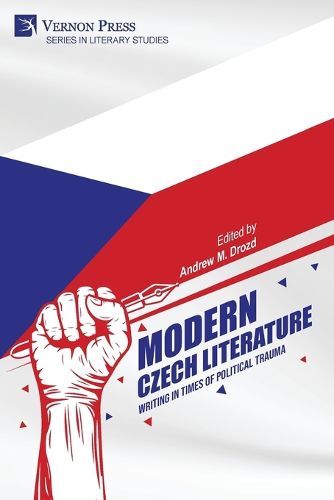Readings Newsletter
Become a Readings Member to make your shopping experience even easier.
Sign in or sign up for free!
You’re not far away from qualifying for FREE standard shipping within Australia
You’ve qualified for FREE standard shipping within Australia
The cart is loading…






This title is printed to order. This book may have been self-published. If so, we cannot guarantee the quality of the content. In the main most books will have gone through the editing process however some may not. We therefore suggest that you be aware of this before ordering this book. If in doubt check either the author or publisher’s details as we are unable to accept any returns unless they are faulty. Please contact us if you have any questions.
Modern Czech culture has experienced a series of political traumas starting in the 1930s. Despite the difficult, shifting conditions, Czech writers have not only managed to contend with the situation, but have produced many fine literary efforts. This volume consists of seven articles by an international team of authors who are specialists in Czech literature. The first four chapters treat very well-known writers. There is one chapter on Karel Capek and his play "The White Plague." There are three chapters on Milan Kundera, the internationally best-known Czech writer, with one of these chapters covering both Kundera and Bohumil Hrabal. The last three chapters deal with more recent and/or lesser-known writers. One chapter treats the Brothers Topol and the music underground, one chapter treats Czech literary responses to the period of the Normalization, and the final chapter treats Eda Kriseova.
This volume presents new perspectives on Czech literature and will be of interest to specialists in Czech literature and history, Central European literature and history, Nazism and Communism. For example, although much has been written about Kundera, the three articles provide further treatments of three different aspects of his work: his ties to Russian literature, his misogyny, and the philosophical content of his novels. Specialists interested in the period of the Normalization (and after) will find the last three chapters particularly useful. The chapters are suitable for classroom use in courses in both Czech literature and Czech (or Central European) history. All material from Czech-language sources presented in the chapters is given in English translation.
$9.00 standard shipping within Australia
FREE standard shipping within Australia for orders over $100.00
Express & International shipping calculated at checkout
This title is printed to order. This book may have been self-published. If so, we cannot guarantee the quality of the content. In the main most books will have gone through the editing process however some may not. We therefore suggest that you be aware of this before ordering this book. If in doubt check either the author or publisher’s details as we are unable to accept any returns unless they are faulty. Please contact us if you have any questions.
Modern Czech culture has experienced a series of political traumas starting in the 1930s. Despite the difficult, shifting conditions, Czech writers have not only managed to contend with the situation, but have produced many fine literary efforts. This volume consists of seven articles by an international team of authors who are specialists in Czech literature. The first four chapters treat very well-known writers. There is one chapter on Karel Capek and his play "The White Plague." There are three chapters on Milan Kundera, the internationally best-known Czech writer, with one of these chapters covering both Kundera and Bohumil Hrabal. The last three chapters deal with more recent and/or lesser-known writers. One chapter treats the Brothers Topol and the music underground, one chapter treats Czech literary responses to the period of the Normalization, and the final chapter treats Eda Kriseova.
This volume presents new perspectives on Czech literature and will be of interest to specialists in Czech literature and history, Central European literature and history, Nazism and Communism. For example, although much has been written about Kundera, the three articles provide further treatments of three different aspects of his work: his ties to Russian literature, his misogyny, and the philosophical content of his novels. Specialists interested in the period of the Normalization (and after) will find the last three chapters particularly useful. The chapters are suitable for classroom use in courses in both Czech literature and Czech (or Central European) history. All material from Czech-language sources presented in the chapters is given in English translation.